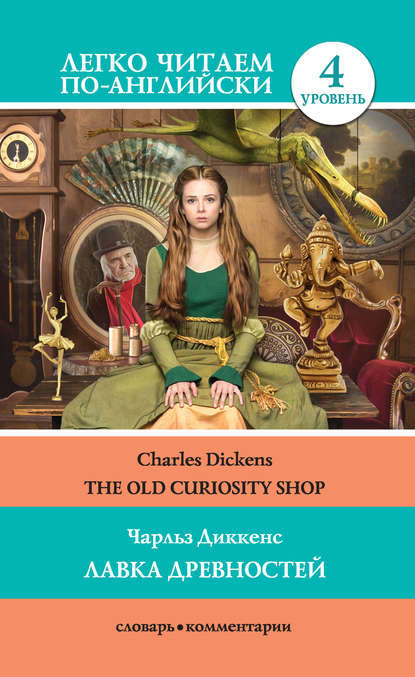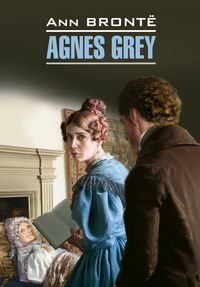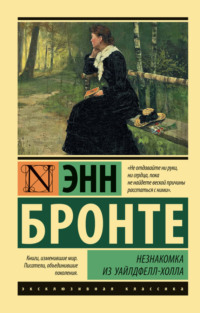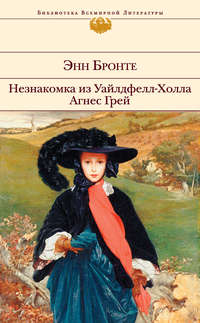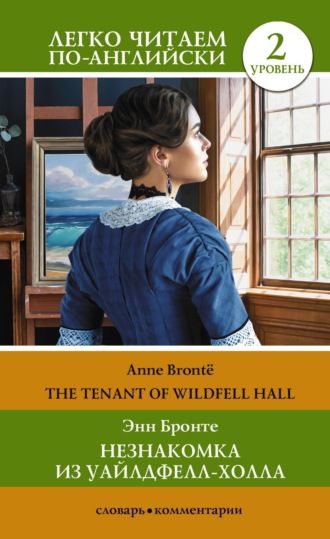
Полная версия
Незнакомка из Уайлдфелл-Холла. Уровень 2 / The Tenant of Wildfell Hall
She was seriously annoyed. Then she took the picture from me; and quickly restored it to the dark corner, with its face to the wall, and then turned to me and laughed.
I carelessly turned to the window. Then I told my sister it was time to go, shook hands with the little gentleman, coolly bowed to the lady, and moved towards the door. Mrs. Graham smiled, – “Mr. Markham, I'm sorry I offended you by my abruptness.”
When a lady apologizes, I can't be angry, of course. We parted good friends for once. This time I squeezed her hand with a cordial pressure.
Chapter VI
During the next four months I did not enter Mrs. Graham's house; but still the ladies continued to talk about her. And still our acquaintance continued, though slowly, to advance. Sometimes I saw her myself, not only when she came to church, but when she was out on the hills with her son. I liked to see Mrs. Graham, and to talk to her. I decidedly liked to talk to her little companion, who was a very amiable and intelligent little fellow. We soon became excellent friends. What pleased her best of all was to see him with Sancho, while I walked by her side – not for love of my company (though I sometimes deluded myself with that idea). Those active sports were invigorating to her son, that's all.
One bright February morning, during twenty minutes' stroll along the moor, she was discoursing with so much eloquence and depth of thought, that I went home enchanted. And I thought it was, perhaps, better to spend one's days with such a woman than with Eliza Millward. Then I (figuratively) blushed for my inconstancy.
“However,” thought I, “I cannot marry Eliza, since my mother so strongly objects to it. So I must not delude the girl with the idea that I intended to do so. Mrs. Graham can be equally objectionable. But I shall not fall seriously in love with the young widow, I think, nor she with me – that's certain.”
One calm, clear afternoon, in March, I saw Mrs. Graham down by the brook, with a sketch-book in her hand. She was absorbed in her favourite art, while Arthur was constructing dams and breakwaters in the shallow, stony stream.
“Do you not find it a desolate place to live in?” said I, after a moment of silent contemplation.
“I do, sometimes,” replied she. “On winter evenings, when Arthur is in bed, and I am sitting there alone. But it is folly to give way to such weakness, I know. Rachel is satisfied with such a life. Indeed, I must be thankful for such an asylum.”
Then bid me good-evening and withdrew.
Soon perceived Mr. Lawrence, on his pretty grey pony. I went a little out of my way to speak to him.
“Was that Mrs. Graham you were speaking to just now?” said he.
“Yes.”
“Humph! I thought so.”
“Well! What then?”
“Oh, nothing!” replied he. “Only I thought you disliked her.”
“Suppose I did. Can't a man change his mind?”
“Yes, of course,” returned he. “Then you have changed your mind?”
“I can't say that I have exactly. No; I think I hold the same opinion – but slightly ameliorated.”
“Oh!” He glanced up at the moon.
“Lawrence,” said I calmly, “are you in love with Mrs. Graham?”
He laughed.
“I am in love with her!” repeated he. “Why do you think so?”
“From the interest you take in the progress of my acquaintance with the lady, and the changes of my opinion concerning her, I thought you were jealous.”
He laughed again.
“Jealous! no. But I thought you were going to marry Eliza Millward.”
“You thought wrong, then; I am not going to marry either one or the other.”
Chapter VII
Not many days after this, on a mild sunny morning, I was out on the hill-side. I beheld three persons below. They were Eliza Millward, Fergus, and Rose; so I crossed the field to meet them. They told me that they were going to Wildfell Hall. I joined them, and offered my arm to Eliza, who readily accepted it.
So we went all. The meagre old maid-servant, that opened the door, ushered us into a tolerably spacious and lofty room.
The lady was seated in a stiff, high-backed arm-chair, with a small round table, containing a desk and a work-basket on one side of her, and her little boy on the other. The boy was leaning his elbow on her knee, and reading to her, with wonderful fluency, from a small volume that lay in her lap.
I do not think Mrs. Graham was particularly delighted to see us. There was something indescribably chilly in her quiet, calm civility; but I did not talk much to her. I called Arthur to me, and he and I and Sancho amused ourselves very pleasantly together. Fergus was interrupting the conversation, or filling up a pause with some impertinent question or remark. At one time it was,
“It, amazes me, Mrs. Graham, how you can choose such a dilapidated, rickety old place as this to live in. If you can't afford to occupy the whole house, why can't you take a neat little cottage?”
“Perhaps this romantic, old-fashioned place, Mr. Fergus,” replied she, “has many advantages over a cottage. You see, the rooms are larger and more airy. The unoccupied apartments, which I don't pay for, may serve as lumber-rooms. They are very useful for my little boy to run about in on rainy days when he can't go out. Then there is the garden for him to play in, and for me to work in.”
“But then how can you bear such a situation – your nearest neighbours two miles distant, and nobody passes by? Rose will go mad in such a place.”
“The loneliness of the place was one of its chief recommendations. I like to be quiet.”
“Oh! Do you want to tell us to leave you alone?”
“No, I dislike an extensive acquaintance; but if I have a few friends, of course I am glad to see them occasionally. No one can be happy in eternal solitude. Therefore, Mr. Fergus, if you choose to enter my house as a friend, I will make you welcome. If not, I will keep you away.”
“And, Mrs. Graham,” said he again, five minutes after, “we were disputing something. Well, the question, or questions for you to answer – ”
“Hold your tongue, Fergus!” cried Rose.
“I won't! The questions are these: first, concerning your birth, extraction, and previous residence. Some people say that you are a foreigner, and some an Englishwoman; some a native of the north country, and some of the south; some say – ”
“Well, Mr. Fergus, I'll tell you. I'm an Englishwoman. I was born in the country, neither in the extreme north nor south of our happy isle. In the country I have passed my life, and now I hope you are satisfied.”
“Except this – ”
“No, not one more!” laughed she, and, to escape my brother's persecutions, drew me into conversation.
“Mr. Markham,” said she, “have you forgotten the fine sea-view we were speaking of some time ago? I think I must trouble you, now, to tell me the nearest way to it. I shall, perhaps, be able to walk there, and take my sketch. I want to see it.”
“Oh, don't tell her, Gilbert!” cried Rose; “she will go with us. I suppose, Mrs. Graham, it is a very long walk, too far for you. But we were thinking about a picnic there. I'm sure we shall all be delighted to have you amongst us.”
Poor Mrs. Graham looked dismayed, and attempted to make excuses.
“Just a nice walk for the gentlemen,” continued Rose; “but the ladies will have their pony-carriage, which will be large enough to contain little Arthur and three ladies, together with your sketching apparatus, and our provisions.”
We rose, and took our leave.
But this was only March: a cold, wet April, and two weeks of May passed over before we ventured forth on our expedition. The company consisted of Mrs. and Master Graham, Mary and Eliza Millward, Jane and Richard Wilson, and Rose, Fergus, and Gilbert Markham.
Mr. Lawrence was invited to join us, but, for some reason he refused to give us his company.. The decision was not displeasing to me.
It was about midday when we reached the place of our destination. Mrs. Graham walked all the way to the cliffs. I have a very pleasant recollection of that walk, along the hard, white, sunny road. Eliza was not beside me; but she was with her friends in the pony-carriage. I was too happy in the company of Mrs. Graham to regret the absence of Eliza Millward.
At length our walk was ended. I looked at my companion to see what she thought of the glorious scene. She said nothing: but she stood still. She had very fine eyes – not brown, but very dark grey. A cool breeze blew from the sea – soft, pure, salubrious. She looked very lovely; my heart warmly cleaved to her.
Mrs. Graham seated herself at a distance from me. Eliza was my nearest neighbour. Soon my heart began to warm towards her once again; and we were all very merry and happy together.
Then Mrs. Graham took her camp-stool and drawing materials. She begged Miss Millward to take charge of her precious son, left us and proceeded along the steep, stony hill.
I rose and cannily slipped away. A few rapid strides soon brought me to her – a narrow ledge of rock at the verge of the cliff. She did not hear me. My shadow across her paper alarmed her. She looked hastily round.
“Oh! I didn't know it was you. Why did you startle me so?” said she testily. “Well, what did you come for? Are they all coming?”
“No; this little ledge can scarcely contain them all.”
“I'm glad, for I'm tired.”
“Well, then, I won't talk. I'll only sit and watch your drawing.”
“Oh, but you know I don't like that.”
“Then I'll admire this magnificent prospect.”
She made no objection to this. I sat beside her there, and said nothing.
“Are you there still, Mr. Markham?” said she at length. “Why don't you go and amuse yourself with your friends?”
“Because I am tired of them, like you.”
“What was Arthur doing when you came away?”
“He was with Miss Millward, where you left him.”
Soon declared her sketch completed, and closed the book. We returned.
The journey homeward was not so agreeable to me as the former part of the day. Now Mrs. Graham was in the carriage, and Eliza Millward was the companion of my walk.
Chapter VIII
It was a splendid morning of June. Most of the hay was cut. My brother ran up to me and put into my hand a small parcel, just arrived from London. I tore off the cover, and disclosed an elegant and portable edition of “Marmion[11].” I hastened away to Wildfell Hall, with the book in my pocket; for it was destined for the shelves of Mrs. Graham.
We met several times, and I found she was not averse to my company.
“Let me first establish my position as a friend,” thought I, “the patron and playfellow of her son, the sober, solid friend of herself, and then we'll see.”
We talked about painting, poetry, and music, theology, geology, and philosophy. Once or twice I lent her a book, and once she lent me one in return. I gave a little dog to her son. I met her in her walks often; I came to her house as often as I dared. One day she expressed a wish to read “Marmion”.
I ventured to ask Mrs. Graham for one more look at the picture she was painting.
“Oh, yes! Come in,” said she (I met her in the garden). “It is finished, all ready; but give me your last opinion.”
The picture was beautiful. But, while I gazed, I thought upon the book, and wondered how to present it. I looked out of the window, and then pulled out the book, turned round, and put it into her hand, with this short explanation:
“You wished to see “Marmion,” Mrs. Graham; and here it is. Please take it.”
A momentary blush suffused her face. She gravely examined the volume; then silently turned over the leaves, in serious cogitation. Then she closed the book, and quietly asked the price of it.
“I'm sorry to offend you, Mr. Markham,” said she, “but unless I pay for the book, I cannot take it.” And she laid it on the table.
“Why cannot you?”
“Because,” she paused, and looked at the carpet.
“Why cannot you?” I repeated.
“Because I don't like to put myself under obligations that I can never repay.”
“Nonsense!” ejaculated I.
She turned her eyes on me again, with a look of quiet, grave surprise.
“Then you won't take the book?” I asked.
“I will gladly take it. How much is it?”
I told her the exact price. She produced her purse, and coolly counted out the money, but hesitated to put it into my hand.
“You think yourself insulted, Mr Markham but I- ”
“I understand you,” I said. “But believe me, I shall build no hopes upon it, and consider this no precedent for future favours.”
“Well, then,” she answered, with a smile. Then she returned the odious money to her purse, “but remember!”
“I will remember. But do not withdraw your friendship from me,” said I.
Chapter IX
Though my affections were fairly weaned from Eliza Millward, I did not yet entirely relinquish my visits to the vicarage. One day I resolved to make my visit a short one, and to talk to Eliza. It was never my custom to talk about Mrs. Graham either to her or anyone else; but Eliza said,
“Oh, Mr. Markham! What do you think of these shocking reports about Mrs. Graham? Can you believe them?”
“What reports?”
“Ah! You know!” she smiled and shook her head.
“I know nothing about them. What do you mean, Eliza?”
“Oh, don't ask me! I can't explain it.”
“What is it, Miss Millward? What does she mean?” I asked her sister.
“I don't know,” replied she. “Some idle slander, I suppose. I never heard it till Eliza told me the other day. I don't believe a word of it – I know Mrs. Graham too well!”
“Quite right, Miss Millward.”
Eliza raised her face, and gave me a look of sorrowful tenderness.
A few days after this we met again. Mrs. Graham arrived also. Mr. Lawrence came too. He seated himself quite aloof from the young widow, between my mother and Rose.
“Did you ever see such art?” whispered Eliza, who was my nearest neighbour.
“What do you mean?”
“Why, you can't pretend to be ignorant!”
“Ignorant of what?” demanded I sharply.
She started and replied, -
“Oh, hush! Don't speak so loud.”
“Well, tell me then,” I answered, “what is it you mean? I hate enigmas.”
She went to the window, where she stood for some time. I was astounded, provoked, ashamed. Shortly after we came to the tea-table.
“May I sit by you?” said a soft voice at my elbow.
“If you like,” was the reply; and Eliza slipped into the vacant chair.
“You're so stern, Gilbert. What have I done to offend you?”
“Take your tea, Eliza, and don't be foolish,” responded I.
Just then Miss Wilson wanted to negotiate an exchange of seats with Rose.
“Will you be so good as to exchange places with me, Miss Markham?” said she; “for I don't like to sit by Mrs. Graham. Your mamma invites such persons to her house!..”
“Will you be so good as to tell me what you mean, Miss Wilson?” said I.
The question startled her a little, but not much.
“Why, Mr. Markham,” replied she, coolly, “it surprises me rather that Mrs. Markham invites such a person as Mrs. Graham to her house. But, perhaps, she is not aware that the lady's character is not respectable.”
“Will you explain me…”
“This is scarcely the time or the place for such explanations. I think you can hardly be so ignorant as you pretend – you must know her as well as I do.”
“I think I do, perhaps a little better; so what?”
“Can you tell me, then, who was her husband, or if she ever had any? ”
Indignation kept me silent.
“Have you never observed,” said Eliza, “what a strange likeness there is between that child of hers and – ”
“And whom?” demanded Miss Wilson.
Eliza was startled.
“Oh, I beg your pardon!” pleaded she; “I may be mistaken – perhaps I was mistaken.”
I stared at Arthur Graham, who sat beside his mother on the opposite side of the table. Then I stared at Mr. Lawrence. There was some likeness, indeed!
Both, it is true, had more delicate features and smaller bones than commonly fall to the lot of individuals of rougher sex.
But did I not know Mrs. Graham? Was I not certain that she was immeasurably superior to any of her detractors; that she was, in fact, the noblest, the most adorable woman here?
Meantime, my brain was on fire with indignation. At length, I rose and left the table and the guests without a word of apology – I could endure their company no longer. I rushed out to the garden.
I nestled up in a corner of the bower, and hoped to stay there alone. But no! Someone was coming down!
It was Mrs. Graham. She was slowly moving down the walk with Arthur, and no one else. Why were they alone? I stepped forward.
“Oh, don't let us disturb you, Mr. Markham!” said she. “We came here to seek retirement ourselves, not to intrude on your seclusion.”
“I am no hermit, Mrs. Graham.”
“I feared you were unwell,” said she.
“Please sit here a little and rest, and tell me how you like this arbour,” said I. “Why have they left you alone?”
“It is I who have left them,” was the rejoinder. “I am tired.”
It was late in the evening before we came back. I offered to accompany Mrs. Graham home. Mr. Lawrence did not look at us, but he heard her denial.
Mrs. Graham thought there was no danger for herself or her child. It was daylight still, and the people were quiet and harmless.
Soon she left. Mr. Lawrence came to me, but I was blind to his extended hand, and deaf to his good-night till he repeated it a second time. Then, to get rid of him, I muttered an inarticulate reply.
“What is the matter, Markham?” whispered he. “Are you angry because Mrs. Graham did not let you go home with her?”
“What business is it of yours?” I demanded.
“Why, none,” replied he with quietness; “only let me tell you, Markham, that if you have any designs in that quarter, they will certainly fail. You are cherishing false hopes, and wasting your strength in useless efforts, and it grieves me.”
“Hypocrite!” I exclaimed.
He held his breath[12], turned white and went away without another word. I wounded him; and I was glad of it.
Chapter X
But the vile slander was born. Rose, however, vowed she did not believe it, and my mother made the same declaration.
Anyway, she said one day,
“Well! I always thought there was something odd about her. This is a sad, sad business!”
“Why, mother, you said you didn't believe these tales,” said Fergus.
“No more I do, my dear; but then, you know, there must be some foundation.”
“The foundation is in the wickedness and falsehood of the people,” said I, “and in the fact that Mr. Lawrence went that way once or twice. The scandal-mongers have greedily seized the rumour.”
“Well, but, Gilbert, there must be something in her manner to countenance such reports.”
“Did you see anything in her manner?”
“No, certainly; but then, you know, I always said there was something strange about her.”
That evening I went to Wildfell Hall. By this time, you see, I was in love with her. I took from the book-case an old volume to offer her, and hastened away.
Arthur was playing with his frolicsome little dog in the garden. I looked over the gate and called him to me.
“Arthur, tell your mother I want to speak to her.”
He ran to perform my bidding, and quickly returned with his mother. How lovely she looked with her dark ringlets!
“Well, Mr. Markham, what is it?” said the young mother.
“I want you to look at this book, and, if you please, to take it, and peruse it at your leisure.”
“Tell him to come in, mamma,” said Arthur.
And we sauntered through the garden, and talked of the flowers, the trees, and the book, and then of other things. The evening was kind and genial, and so was my companion. We passed a rose-tree. She plucked a beautiful half-open bud and bade me give it to Rose.
“May I not keep it myself?” I asked.
“No; but here is another for you.”
I took the hand that offered it, and looked into her face.
“Mr. Markham,” said she, with desperate calmness, “I must tell you something. I like your company, because I am alone here, and your conversation pleases me more than that of any other person. But if you cannot regard me as a friend – a plain, cold, motherly, or sisterly friend – I must beg you to leave me now, and let me alone hereafter. In fact, we must be strangers for the future.”
“I will, then – be your friend, or brother, or anything you wish. But tell me why I cannot be anything more?”
There was a perplexed and thoughtful pause.
“Is it in consequence of some rash vow?”
“It is something of the kind,” she answered. “Some day I may tell you, but at present please leave me, Gilbert.”
How sweet, how musical my own name sounded in her mouth!
“May I come to see you now and then[13]?”
“Perhaps – occasionally.”
“And will you always call me Gilbert? It sounds more sisterly.”
She smiled and re-entered the house and I went down the hill. But suddenly the tramp of horses' hoofs fell on my ear, and broke the stillness of the dewy evening. I saw a solitary equestrian. I knew him at a glance: it was Mr. Lawrence on his grey pony. He saw me and wanted to turn back, but then continued his course as before. He accosted me with a slight bow, and wanted to pass on; but I seized his horse by the bridle, and exclaimed,
“Now, Lawrence, tell me where you are going, and what you mean to do!”
“Will you take your hand off the bridle?” said he quietly, “you're hurting my pony's mouth.”
“You and your pony be – ”
“What makes you so coarse and brutal, Markham? I'm quite ashamed of you.”
“You answer my questions – before you leave this spot! I will know what you mean by this perfidious duplicity!”
“I shall answer no questions till you let go the bridle.”
“Now then,” said I and unclosed my hand.
“Ask me some other time, when you can speak like a gentleman,” returned he. “Mr. Markham, this is too much![14] Can I not go to see my tenant?”
“This is no time for business, sir! I'll tell you, now, what I think of your conduct.”
“Really? Here's the vicar.”
And, in truth, the vicar was just behind me. I immediately released the squire; and he went on his way.
“What! Quarrelling, Markham?” cried the vicar, “and about that young widow, I think?” he added. “But let me tell you, young man, she's not worth it.”
“Mr. Millward!” I exclaimed, turned away, and hastened homewards.
Chapter XI
Three weeks passed over. Mrs. Graham and I were now friends – or brother and sister. She called me Gilbert, and I called her Helen. I saw her twice a week. I behaved with such propriety that she never had occasion to reprove me once. This assumption of brotherly nonchalance was very hard to sustain, and I often felt myself a hypocrite with it all. I saw too, or rather I felt, that, in spite of herself, I was not indifferent to her.
“Where are you going, Gilbert?” said Rose, one evening, shortly after tea.
“To take a walk,” was the reply.
“You're going to Wildfell Hall, aren't you?”
“So what?”
“It's better not to go there so often.”
“Nonsense, child! I don't go once in six weeks – what do you mean?”
“Well, I've heard so much about her lately, both at the Wilsons' and the vicarage… And don't you remember last winter, Gilbert, all that about the false name to the picture; and how she explained it; and then, how suddenly she started up and left the room when that person came – and who Arthur told us was his mamma's friend?”
“Yes, Rose, I remember it all. But thank God, I know her.”
“Oh, Gilbert! You know nothing of her former life; and last year, at this time, you did not know that such a person existed. But what will mamma say, Gilbert?”
“Mamma needn't know.”
“But she must know some time.”
“Mrs. Graham and I are two friends – and will be.”
“Jane Wilson thinks your visits to the old hall are another proof of her depravity.”
“Confound Jane Wilson!”
“And Eliza Millward is quite grieved about you.”
“How do they know that I go there?”
“They spy out everything.”
“Oh, I never thought of this! And so they dare to turn my friendship into food for further scandal against her! That proves the falsehood of their other lies.”
Just at that moment the vicar entered the room. Just then my mother came in, and offered him a cup of tea.





